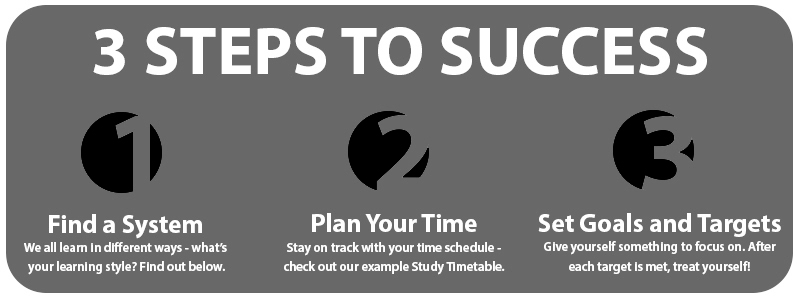We have put together a comprehensive guide to help you manage and get through your studies whether you are revising for exams or working on an essay or big project. Give yourself the best chance of success!

Top Study Tips
Create a Timetable
Give yourself enough time to study – don’t leave it until the last minute! Organise your daily routine into something that works best for you and take the time to get it right.
Check out our example study timetable in the section below.
Organise Your Study Space
Make sure you have plenty space for all your studying tools – books, paper, stationary, laptop etc. A cluttered desk is a cluttered mind!
Find somewhere to study where you won’t be easily distracted.
Understand Your Own Learning Style
What’s the point in spending hours of your time making flashcards and mind maps if you’d remember the information better by reading it out loud to yourself a few times?
There is no ‘perfect’ way to study because everyone learns in a different way! Once you understand your learning style, remembering and recalling new information will become much easier.
Take a look at the different styles of learning in the section below.
Take Regular Breaks
If you are starting to feel stressed, tired and that you can’t take in any more information – take a break! Taking regular breaks will improve your concentration levels when you are studying as you will always be feeling refreshed after a break.
Take a break and do whatever you like to do to chill out – step outside for some fresh air, get up and walk around, make yourself a tea or coffee, check your messages or social feed.
If you’re taking a longer break you could meet up with a friend or grab an hour in the gym. Exercise is a powerful enabler which boosts your brain’s ability to be productive – take a swift walk around the block!
Snack on Brain Food
Although you may feel the need to snack on your favourite chocolate bar or bag of crisps, choosing nutritious foods that have been proven to aid concentration and memory will be a lot more beneficial to your energy levels and focus.
As well as eating top quality ‘brain food, drinking plenty of water is a top tip to keep you well hydrated and your brain working at its best.
Have a look at our suggested ‘brain food’ snack-age section!
Bounce Ideas off Family & Friends
Try explaining your answer to a question to them. This will help you to get the information clear in your head and also get their input on any areas you may need to work more on.
Get together with friends and study together in a group. This can be a great way to help each other and bounce ideas from one another - just make sure you don't get distracted!
Reward Yourself
Find the right balance between study and leisure – if you work hard you deserve a treat now and again!It’s not all about studying every hour of the day, you need to give yourself a break too.
Think Positive!
Stay motivated in your thoughts and try not to get too stressed out. Take the pressure off yourself and relax.
If it's all getting too much one day, start a deadline/exam day countdown – you’ll have something to focus on to get you through your studying.
Making a Study Timetable
While you may think it's best to study for as many hours as possible, this can actually be counterproductive. If you were training for a marathon, you wouldn't try to run 24 hours a day! Shorter 30-minute study spells have been known to work best and therefore taking short, frequent breaks really help.
Here's an example of a timetable you can create and stick to, like you would if you were given it by your school, college, or university.
Everyone is different, develop a study system that works for you.
If you study better in the morning, start early before taking a break at lunchtime. Or if you're more productive at night time, take a longer break earlier on so you're ready to get down to studying in the evening.
Adapt to your Learning Style
Visual Learners
You learn by seeing and best understand words that evoke images. You respond well to demonstrations and enjoy visually pleasing presentations.
Best ways to study:
- Use maps, charts, graphs, and diagrams
- Use videos and presentations
- Make and use flashcards
- Focus on titles when reading
- Highlight and underline text when reading
Auditory Learners
You learn by listening and verbalising and listen for keywords and phrases. You respond well when things are explained out loud and think in a linear fashion.
Best ways to study:
- Record lectures and lessons and listen back later
- Read material out loud to yourself
- Record yourself reading notes and replay it later
- Explain concepts aloud in your own words
- Use word associations to help you remember
Kinaesthetic Learners
You learn through doing and trial-and-error and prefer a more 'hands-on' approach. You use multiple senses to engage with material and enjoy solving real-life problems.
Best ways to study:
- Make and use flashcards
- Study with others and exchange ideas
- Study in short intervals
- Use examples when taking notes to help associate the material.
Find out what your learning style is by completing this short quiz
The Best Brain Food
Wholegrains
The ability to concentrate and focus comes from the adequate, steady supply of energy - in the form of glucose in our blood to the brain. You can get this from wholegrain foods such as granary bread, brown pasta, and brown cereals.
For a quick hit try snacking on wholegrain crackers or pretzels rather than a bag of crisps!
Snack ideas:Vegetables & Fruit
This is a little obvious; we all know that more vegetables and fruit provide much-needed minerals, ions, and vitamins. Vegetables and fruit are also low in calories, delicious and can give you an energy boost when you are working away studying. Top snacking fruits include apples, bananas, avocados, and berries - especially blueberries.
Research by Tufts University found that eating blueberries may be effective in improving or delaying short term memory loss!
Snack ideas:
Peanut Butter
Lots of people think peanut butter is unhealthy but it actually contains healthy fats and lots of protein. This means that as a brain food, just a little peanut butter can keep you full for a long time. Also, peanut butter has a long shelf life so you can always keep a jar handy in your cupboard, bedroom or wherever you study in case you get peckish!
Why not try spreading some on your toast in the morning for breakfast.
Snack ideas:
Nuts & Seeds
Nuts and seeds are full of all the good stuff your body needs and snacking on them couldn't be easier - just grab a handful and you're good to go!
Here's a few more ideas if you're feeling extra adventurous...
Snack ideas:
Dark Chocolate
As long as you follow the “everything in moderation” rule, dark chocolate can provide benefits like antioxidants and helps with natural brain stimulation. Dark chocolate also can help with the production of endorphins, helping you conquer your studying session while boosting your mood.
Recommended for all sweet tooths!
Snack ideas:
Coffee & Tea
Although technically not a food - coffee and tea are both strong contenders for getting you through long days of studying. Just like dark chocolate though, everything in moderation! Although too much coffee and tea is certainly bad for you, research has shown a few cups a day can be beneficial, especially when you are in need of a caffeine kick.
Ditch the sugary energy drinks and boil the kettle for a cuppa instead!
5 Apps For Students
SelfControl
This app is great to stop you from being distracted while you’re trying to study. SelfControl allows you to block certain websites for a set amount of time which in turn allows you to concentrate fully on your studies and avoid checking your social networks or emails.
Once you put the block in place it’s impossible for you to access the websites until the time block has expired so you can’t just turn it on and off when you like! Great for those of you who are easily distracted.
This app is free and compatible with iOS.
Maths Alarm Clock
Maths Alarm Clock is a great app for getting you up and out of bed! If you are a student who suffers from continuously pressing the snooze button in the morning, then this app is for you. The app makes you solve a simple math problem in order to turn the alarm off.
Having to solve a math problem in the morning will also get your brain working quicker, like exercise for your brain!
This app is compatible with iOS and Android.
TED
This educational app will allow you to discover some of the world’s most fascinating people. Educators, radical technology geniuses, medical mavericks, business experts and legends of music, TED has it all.
Enjoy the best conferences in the world at your leisure and learn at the same time!
This app is free and compatible with iOS and Android.
Evernote
Evernote is great for all you busy students who have long to-do lists and jam-packed schedules. You can create to-do lists, lecture notes, reminders and the app syncs all your data on all of your devices.
Evernote works across various file formats so you can save notes in text, image, audio, and web links to look at later with or without an internet connection.
This app is free and compatible with iOS and Android.
ExamTime
ExamTime is the ultimate learning tool for students. It allows you to create online mind maps, flashcards, online notes and quizzes. All of which are designed to help you improve your learning and prepare for exams.
ExamTime allows you to create study resources and share them with your classmates while all being stored in one place.
This app is free and accessible through desktop.












